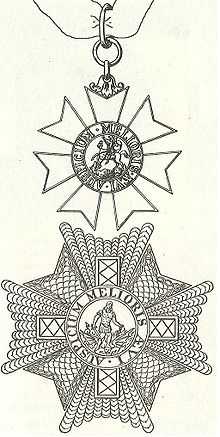Richard Dearlove
| Sir Richard Dearlove | |
|---|---|
|
| |
| Allegiance |
|
| Service | Secret Intelligence Service (SIS/MI6) |
| Active | 1966–2004 |
| Rank | Chief of SIS/MI6 |
| Award(s) |
|
|
| |
| Born |
23 January 1945 Gorran Haven, Cornwall |
| Nationality | British |
| Occupation | Intelligence officer |
| Alma mater | Queens' College, Cambridge |
Sir Richard Billing Dearlove, KCMG OBE (born 23 January 1945) was head of the British Secret Intelligence Service (MI6) from 1999 until 6 May 2004. Sir Richard has been Master of Pembroke College, Cambridge since 2004.
Early life and education
Dearlove was born at Gorran Haven in Cornwall,[1] son of Jack Dearlove, 1948 Olympic silver medallist,[2] and attended Monkton Combe School near Bath, the Kent School in Kent, Connecticut, and Queens' College, Cambridge.[3]
Career
He joined MI6 in 1966 and was posted to Nairobi in 1968.[4] After being posted to Prague, Paris and Geneva he became head of Washington station in 1991,[4] director of personnel and administration in 1993 and director of operations in 1994.[4] Dearlove became chief in 1999.[4]
Sir Richard's tenure as the head of MI6 saw many momentous events for the service:
- 2000 – MI6 Headquarters at Vauxhall Cross is attacked by an RPG-22 Netto one-shot, disposable, anti-tank rocket launcher.
- 2001 – Service criticised for failing to establish and warn that Al-Qaeda was planning anything on the scale of the 11 September attacks.
- The "War on Terror", the US invasion of Afghanistan and the 2003 invasion of Iraq.
- Tension with the Government over the evidence for war on Iraq. It has been suggested that many within the intelligence community were uneasy that their qualified judgements on Iraq's weapons of mass destruction were presented as hard facts in various dossiers (e.g. September Dossier). In July 2002, Dearlove told ministers that in the US "intelligence and facts were being fixed around the policy".[5]

Dearlove was elected Master of Pembroke College, Cambridge on 1 August 2004.[4] He accepted an invitation to become the Chairman of Trustees of the Cambridge Union Society in 2006.[1] As Master of Pembroke, Dearlove is ex officio chairman of the board of Trustees of Pembroke House, a community centre in Walworth, London via the college's patronage of the advowson of St Christopher's, Walworth (CofE).[6][7]
In February 2008 Dearlove gave evidence at the inquest of Princess Diana's death, responding to Harrod's owner Mohamed al-Fayed who claimed that MI6 had murdered Diana.[4]
Sir Richard is a signatory of the Henry Jackson Society principles.[8] He is also a "senior advisor" to the Monitor Group – a global consultancy and private equity firm which has been implicated in undertaking PR work for Libya and Muammar Gaddafi. In April 2013, it was announced that Dearlove joined the advisory board of Ergo, a global intelligence and advisory firm.[9]
On 15 February 2011 Dearlove gave a talk at the Cambridge Union Society, taking as his theme the question of how much secrecy the UK needs: "The short answer to that question is that it needs some but actually not as much as you think."[10](2:48) He said he "would definitely draw a parallel at the moment between the wave of political unrest which is sweeping through the Middle East, in a very excited and rather extraordinary fashion, and also the Wikileaks phenomenon",[10](3:25) but added later, in connection with the way technological advances was altering the norms of civic and private life, commenting on WikiLeaks founder Julian Assange, that " ... the Assange story, as such, is ultimately a distraction. He's a very undignified flag-carrier, in my opinion, for a very important issue."[10](11:50)
In 2012 Dearlove took a sabbatical from Cambridge University to write an account of events leading up to the 2003 invasion of Iraq from his perspective at MI6, including coverage of the production of the so-called "dodgy dossier". Publishing such an account would be unprecedented for a former Chief of the Secret Intelligence Service. He may release this after the Chilcot Inquiry findings are published.[11]
On 7 July 2014, in a lecture at the Royal United Services Institute, Dearlove argued that the government and media had exaggerated the Islamist terrorism threat to the UK, giving extremists publicity counter-productive to UK interests.[12][13]
References
- ↑ 1.0 1.1 Exeter University: Honorary Graduates
- ↑ "The Olympic hero they kept in hiding". Daily Telegraph. 4 July 2012. Retrieved 8 January 2013.
- ↑ New MI6 spymaster named, BBC News, 25 February 1999. Accessed 13 February 2008.
- ↑ 4.0 4.1 4.2 4.3 4.4 4.5 Profile: Sir Richard Dearlove BBC News, 20 February 2008
- ↑ Five key questions to be answered, The Guardian
- ↑ www.southwark.anglican.org
- ↑ Pembroke College Mission
- ↑ Signatories to the Statement of Principles, Henry Jackson Society
- ↑ Sir Richard Dearlove Joins Ergo's Advisory Board, PR Newswire, 23 April 2013, Retrieved 12 June 2013
- ↑ 10.0 10.1 10.2 "Sir Richard Dearlove". Cambridge Union Society. 7 July 2011. Retrieved 7 August 2011.
- ↑ Melanie Hall (21 July 2013). "Former head of MI6 threatens to expose secrets of Iraq 'dodgy dossier'". Daily Telegraph. Retrieved 12 July 2014.
- ↑ Richard Norton-Taylor (7 July 2014). "Islamist terror threat to west blown out of proportion - former MI6 chief". The Guardian. Retrieved 12 July 2014.
- ↑ "'Pathetic' Britons in Syria and Iraq do not pose threat, says former MI6 chief". Daily Telegraph. 7 July 2014. Retrieved 12 July 2014.
External links
| Government offices | ||
|---|---|---|
| Preceded by Sir David Spedding |
Chief of the SIS 1999–2004 |
Succeeded by Sir John Scarlett |
| Academic offices | ||
| Preceded by Sir Roger Tomkys |
Master of Pembroke College, Cambridge 2004–2015 |
Succeeded by Incumbent |